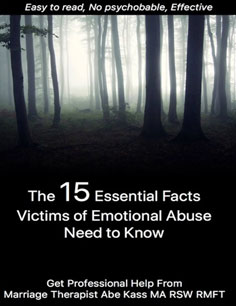
Emotional abuse is a form of psychological abuse and occurs when one individual dominates another. This type of abuse can take many forms such as insults, criticism, belittling, name-calling, threats, and physical violence (domestic violence requires its own type of solution).
The Emotional Abuse Test is a tool to help determine if you are in an abusive relationship.
If you answer “yes” to any of the questions on the Emotional Abuse Test, there is a chance you are being emotionally abused by your husband, wife, boyfriend, or girlfriend.
If you are in a high-conflict relationship, it is important to know the common signs of abuse to determine if you are emotionally abused.
Please note: that verbal abuse, mental abuse, psychological abuse, sexual abuse, domestic violence, and financial abuse are all variations of emotional abuse. This professional emotional abuse quiz is based on the work of Brian Jory, Ph.D. in the Journal of Marital and Family Therapy.
Emotional Abuse Test — 15 easy to answer questions
This Test is Completely FREE. No Email Required. Get Immediate Results.
Private and Confidential
FREE Bonus: Get The 12 PRINCIPLED POSITIONS To End The Abuse found at the end of this post. Print it out and use it as a guide to stop emotional abuse, verbal abuse, mental abuse, psychological abuse, sexual abuse, or financial abuse.
Quiz Summary
0 of 15 Questions completed
Questions:
Information
You have already completed the quiz before. Hence you can not start it again.
Quiz is loading…
You must sign in or sign up to start the quiz.
You must first complete the following:
Results
Results
Time has elapsed
You have reached 0 of 0 point(s), (0)
Earned Point(s): 0 of 0, (0)
0 Essay(s) Pending (Possible Point(s): 0)
Categories
- Emotional Abuse 0%
Note: The results of this Emotional Abuse Test are not definitive, and for the most accurate results seek the counsel of a certified relationship specialist. The author of this site, Abe Kass, assumes no responsibility for any inaccuracies or unintended misinformation. The user of this Emotional Abuse Test and associated information does so at his or her own risk.
The Meaning of Your Emotional Abuse Test Results:
15 – 29 POINTS
Based on your emotional abuse quiz score, there is likely no emotional abuse in your relationship. You have a healthy relationship. Your partner behaves respectfully and kindly towards you. You are fortunate!
Hopefully, you also treat your partner with kindness and respect. Your relationship future looks good.
30 – 40 POINTS
Based on your emotional abuse quiz score, you are likely reasonably safe from emotional abuse, or if it is present, it is minor. However, if you and your partner are not careful, your relationship could slip into a situation where it becomes abusive.
Monitor relationship interactions that include bickering, anger, reduced romance/sex, or ignoring each other. Find out if you are in a toxic relationship and need to take preventative action to prevent abuse as explained in the section about cures for a toxic relationship.
Relationship problems that are not dealt with can become chronic, difficult to reverse, and eventually lead to a pattern of abuse.
41 – 50 POINTS
Based on your Emotional Abuse Test score, you are likely to be emotionally abused.
You are advised to make positive changes in your relationship to establish safety and prevent the abuse from getting worse. It is important to know that your partner may not intend to hurt you. They may benefit from learning relationship skills so they know how to behave properly. For example, some individuals upon learning anger management skills go on to stop their abusive behavior.
Let your partner take this emotional abuse quiz to increase their awareness of what emotional abuse is and how to avoid it. Assistance from a qualified professional relationship specialist can be of great assistance as well as self-help programs such as books, audio programs, or courses on abuse.
Consider buying my book on emotional abuse. The 15 Essential Facts Victims of Emotional Abuse Need to Know. It is easy to read, inexpensive, and available as an immediate download or as a paperback from Amazon. See below to learn more about The 15 Essential Facts Victims of Emotional Abuse Need to Know.
51 and MORE POINTS
Based on your Emotional Abuse Test score, it seems like there are dangerous levels of emotional abuse in your relationship.
Your test results suggest that you find a professional who is experienced and knowledgeable on abuse to help you fully assess the levels of abuse in your relationship. You need to be certain you and other family members are safe from physical violence. After you know you are safe, you can then consider your options to free yourself from your emotionally abusive situation.
Your emotional abuser MUST change for the better if you are to have a loving, respectful, and friendship-based relationship and healthy self-esteem. However, if your abuser will not change, you need to evaluate whether you should continue to live with him or her.
The longer you remain in an abusive relationship, the greater the risk of serious injury and long-term harm. To protect yourself, and if you have children to protect them as well, you need to develop with the help of others, a realistic plan to free yourself from abuse.
- Review
- Answered
- Correct
- Incorrect
- Question 1 of 15
1. Question
- Question 2 of 15
2. Question
- Question 3 of 15
3. Question
- Question 4 of 15
4. Question
- Question 5 of 15
5. Question
- Question 6 of 15
6. Question
- Question 7 of 15
7. Question
- Question 8 of 15
8. Question
- Question 9 of 15
9. Question
- Question 10 of 15
10. Question
- Question 11 of 15
11. Question
- Question 12 of 15
12. Question
- Question 13 of 15
13. Question
- Question 14 of 15
14. Question
- Question 15 of 15
15. Question





